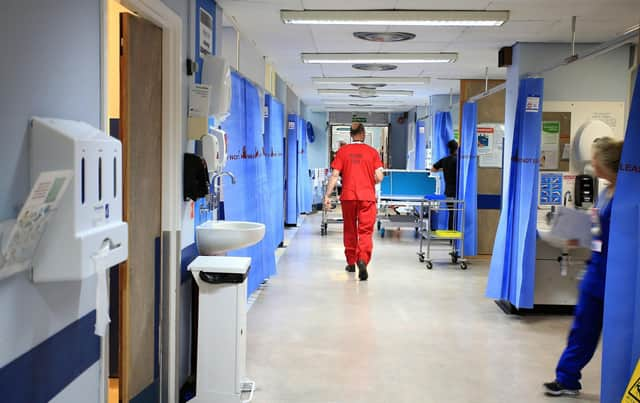Hospital waiting lists: Judicial intervention would be 'manifestly inappropriate', rules Court of Appeal


Senior judges held that political leaders, doctors and other experts were better equipped to find solutions to an alleged dysfunctional healthcare system.
They dismissed challenges by two Belfast women seeking declarations that the authorities have breached a legal duty to provide necessary medical treatment within a reasonable time. Claims by May Kitchen and Eileen Wilson that the delays violated their human rights were also rejected.
Advertisement
Hide AdAdvertisement
Hide AdLord Justice McCloskey said: “The forum for debate, inquiry, investigation and proposals for improvement and resolution of the issues raised in these proceedings - fundamentally, the single issue of hospital waiting lists in Northern Ireland - belongs to government ministers, politicians, economists, sociologists, doctors, academics and doubtless other experts. The subject is one of much controversy and obviously broad and substantial dimensions. It is manifestly inappropriate for judicial intervention.”
Mrs Kitchen, a 78-year-old retired nurse who lives alone in north Belfast, was diagnosed with cataracts back in 2015. Amid fears that she would lose her sight, the pensioner was told that she faced a wait of 42 months for surgery. She eventually used medical insurance for private treatment, but insisted that she should not be out of pocket due to her entitlement to free healthcare.
Ms Wilson, a 49-year-old mother of six from east Belfast, was referred by her GP for an urgent consultation with a neurologist about her suspected multiple sclerosis in June 2017. It was only in May this year that she obtained an MRI to investigate the symptoms, according to her lawyers.
Legal action has been brought by the women against the Department of Health as well as the Belfast and South Eastern Health and Social Care Trusts.
Advertisement
Hide AdAdvertisement
Hide AdA previous court heard one in seven people in Northern Ireland have spent longer than 12 months on a hospital waiting list. It was also set out that prospective patients in the region are nearly 50 times more likely than those in Wales to face a year-long wait for care.
Both women mounted appeals after the High Court dismissed their initial challenges.
Their barrister claimed a dysfunctional system in Northern Ireland has led to hospital waiting lists reaching “catastrophic” levels
It was contended that the authorities have breached an obligation under Section 2 of the Social Care (Reform) Act (Northern Ireland) 2009 to provide effective healthcare.
Advertisement
Hide AdAdvertisement
Hide AdThe Court of Appeal heard details of a bleak assessment in a report by Ulster University Professor Deirdre Heenan on the gulf between waiting lists in Northern Ireland and the rest of the UK. Those findings included:
- By September 2021 one in four people were waiting to see a consultant for the first time – increasing by almost 10% in a year.
- Over half of patients had been on a list for more than 12 months.
- Some people were waiting for up to five years for routine orthopaedic treatment, four years for ear, nose and throat procedures, and up to seven years for urology appointments.
Advertisement
Hide AdAdvertisement
Hide Ad- Urgent, red-flag cancer patients have had operations cancelled, with potential worsening of the disease and increases in preventable deaths.
But Lord Justice McCloskey held that Professor Heenan’s report underscored the limitations on the judicial role in the cases.
“One person of admitted expertise has presented the court with an elaborate critique of the subject of hospital waiting lists and related issues in Northern Ireland,” he said.
“However, this is but a single expert opinion.”
All legal arguments advanced on behalf of the appellants were rejected.
Advertisement
Hide AdAdvertisement
Hide AdThe judge pointed out that both women have been provided with publicly funded services within a statutory regime free of charge.
“The Appellant, Mrs Kitchen, opted to receive, and pay an insurance premium which entitled her to receive certain medical services provided by the private health sector,” he added.
“These services were not provided ‘under’ any of the relevant statutory measures.”
Dismissing the appeal, the judge indicated that other sectors were better qualified to deal with the issue of hospital waiting lists.
He concluded: “This court of supervisory superintendence does not possess the traits or credentials, expert or otherwise, of the members of the aforementioned forum.”